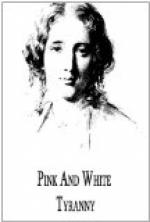Lillie had acquired at school the doubtful talent of reading French with facility, and was soon deep in the fascinating pages, whose theme is the usual one of French novels,—a young wife, tired of domestic monotony, with an unappreciative husband, solacing herself with the devotion of a lover. Lillie felt a sort of pique with her husband. He was evidently unappreciative: he was thinking of all sorts of things more than of her, and growing stupid, as husbands in French romances generally do. She thought of her handsome Cousin Harry, the only man that she ever came anywhere near being in love with; and the image of his dark, handsome eyes and glossy curls gave a sort of piquancy to the story.
John got deeply interested in his book; and, looking up from time to time, was relieved to find that Lillie had something to employ her.
“I may as well make a beginning,” he said to himself. “I must have my time for reading; and she must learn to amuse herself.”
After a while, however, he peeped over her shoulder.
“Why, darling!” he said, “where did you get that?”
“It is Mrs. Follingsbee’s,” said Lillie.
“Dear, it is a bad book,” said John. “Don’t read it.”
“It amuses me, and helps pass away time,” said Lillie; “and I don’t think it is bad: it is beautiful. Besides, you read what amuses you; and it is a pity if I can’t read what amuses me.”
“I am glad to see you like to read French,” continued John; “and I can get you some delightful French stories, which are not only pretty and witty, but have nothing in them that tend to pull down one’s moral principles. Edmond About’s ‘Mariages de Paris’ and ‘Tolla’ are charming French things; and, as he says, they might be read aloud by a man between his mother and his sister, without a shade of offence.”
“Thank you, sir,” said Mrs. Lillie. “You had better go to Rose Ferguson, and get her to give you a list of the kinds of books she prefers.”
“Lillie!” said John, severely, “your remarks about Rose are in bad taste. I must beg you to discontinue them. There are subjects that never ought to be jested about.”
“Thank you, sir, for your moral lessons,” said Lillie, turning her back on him defiantly, putting her feet on the fender, and going on with her reading.
John seated himself, and went on with his book in silence.
Now, this mode of passing a domestic evening is certainly not agreeable to either party; but we sustain the thesis that in this sort of interior warfare the woman has generally the best of it. When it comes to the science of annoyance, commend us to the lovely sex! Their methods have a finesse, a suppleness, a universal adaptability, that does them infinite credit; and man, with all his strength, and all his majesty, and his commanding talent, is about as well off as a buffalo or a bison against a tiny, rainbow-winged gnat or mosquito, who bites, sings, and stings everywhere at once, with an infinite grace and facility.




